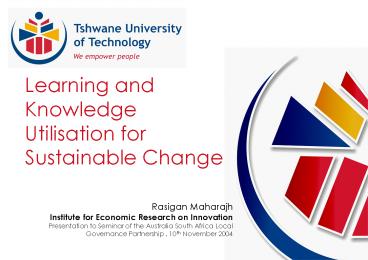Learning and Knowledge Utilisation for Sustainable Change - PowerPoint PPT Presentation
1 / 14
Title:
Learning and Knowledge Utilisation for Sustainable Change
Description:
Learning and Knowledge Utilisation for Sustainable Change Rasigan Maharajh Institute for Economic Research on Innovation Presentation to Seminar of the Australia ... – PowerPoint PPT presentation
Number of Views:100
Avg rating:3.0/5.0
Title: Learning and Knowledge Utilisation for Sustainable Change
1
Learning and Knowledge Utilisation for
Sustainable Change
Rasigan Maharajh Institute for Economic Research
on Innovation Presentation to Seminar of the
Australia South Africa Local Governance
Partnership , 10th November 2004
2
Outline
- Introduction
- Context
- Challenges of local governance
- Knowledge Generation
- Scale, scope and dynamic
- Knowledge Utilisation
- Capacity, Capability, Competency
- Knowledge Sourcing
- Partnerships
- New tools for old systems
- Concluding thoughts
Institute for Economic Research on Innovation
3
Introduction
- Context 1
- At all times, communities should be informed of
steps taken to address whatever challenges
confront them and on process. - Partnerships should be formed so that the
resolution of the problems becomes a collective
effort of government and communities - Thabo Mbeki NCoP - (2004)
Institute for Economic Research on Innovation
4
Introduction
- Challenges of Local Governance
- Local government is a critical player in the
government supply chain - Increasingly functions have been shifted or
assigned to local government, at times without
the necessary resources and capacity - We must guard against provincial and national
departments assigning responsibilities without
proper coordination and consultation - Geraldine Fraser-Moleketi SACN - (2004)
Institute for Economic Research on Innovation
5
Knowledge Generation
- Print, film, magnetic, and optical storage media
produced about 5 exabytes of new information in
2002 - 630, 000, 000, 000 Books
- www.sims.berkeley.edu/research/projects/how-much-i
nfo/
Institute for Economic Research on Innovation
6
Knowledge Utilisation
- Capacity
- ability to perform or produce
- maximum possible production
- power to learn or retain knowledge
- ability to understand the facts and significance
of behaviour
Institute for Economic Research on Innovation
7
Knowledge Utilisation
- Capability
- Being physically, intellectually and legally able
- Aptitudes that may be developed
- Maximum load that a machine, station or system
can carry under specified conditions for a given
interval without exceeding approved limits - Context specific skill that can be broken down to
its component behaviours
Institute for Economic Research on Innovation
8
Knowledge Utilisation
- Competency
- Areas of personal capability that enable people
to perform successfully in their jobs by
completing task effectively - Includes knowledge, attitudes, skills,
organisation values, and personal values - Usually acquired through talent, experience, or
training - comprises the specification of knowledge and
skill and the application of that knowledge and
skill to the standard of performance required
Institute for Economic Research on Innovation
9
Knowledge Sourcing
- Resources
- Learning from self doing
- Learning from others doing
- Good practices
- Partnerships with local higher education
institutions and other public good agencies - Peer-to-Peer Reviews, Evaluations, Monitoring and
Learning
Institute for Economic Research on Innovation
10
New Tools for Old Systems
- Updating the economic institutional regime
- Upgrading education learning
- Building information infrastructure
- Raise the technological level of the economy
- Actively diffusing new technologies throughout
the country - Improving the Research Development system
- Exploiting global knowledge
- World Bank advice to China in Preparing for the
Knowledge Economy (2002)
Institute for Economic Research on Innovation
11
The Big Picture
Natural Capital (Endowments)
Well- being
Produced Capital (Physical Disembodied
Technology)
Human Social
Political
Economic
GDP
Social Capital (Norms networks facilitating
inter- intra-group cooperation)
Environmental
Human Capital (Learning Health)
OECD (2001) Social Capital
Institute for Economic Research on Innovation
12
Concluding Challenges
- system view components are interrelated,
self-organising and dynamic whether biological,
ecological, technical or social - Theory-based facts trust in faith
- Fact-based theories trust in evidence
Institute for Economic Research on Innovation
13
Conclusion
- Support Nonlinear Thinking
- Encourage Multiple Perspectives
- Determine Perspective
- Understand Context and Dynamics of Change
- Integrate Information into Knowledge
- Visualise and Verbalise
Institute for Economic Research on Innovation
14
Thank You
- For more information, contact
- rasigan_at_antfarm.co.za
Institute for Economic Research on Innovation































